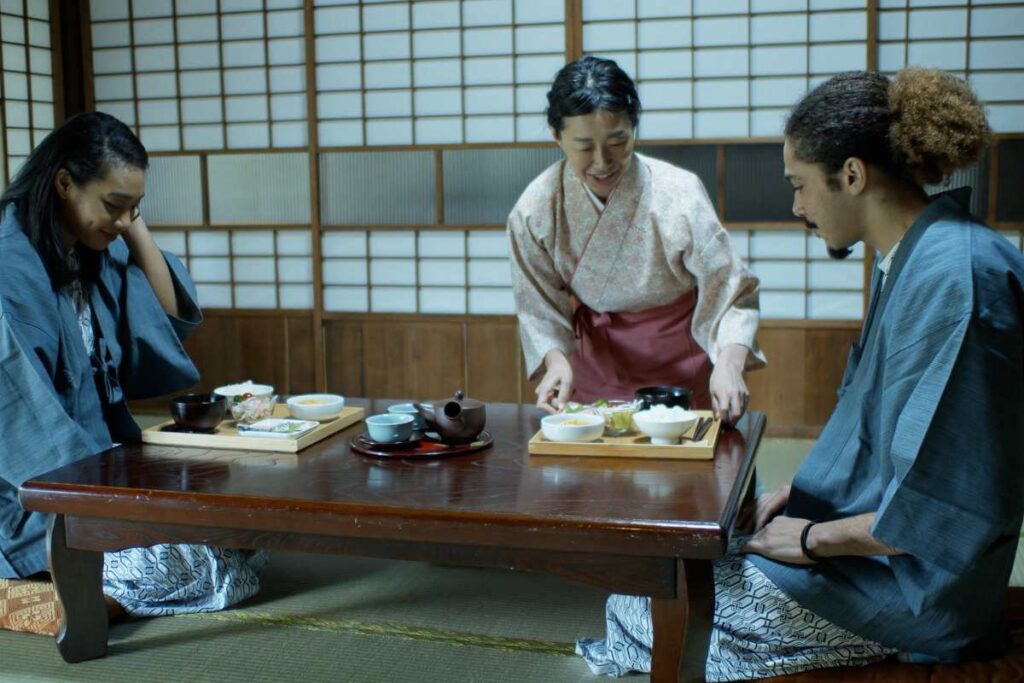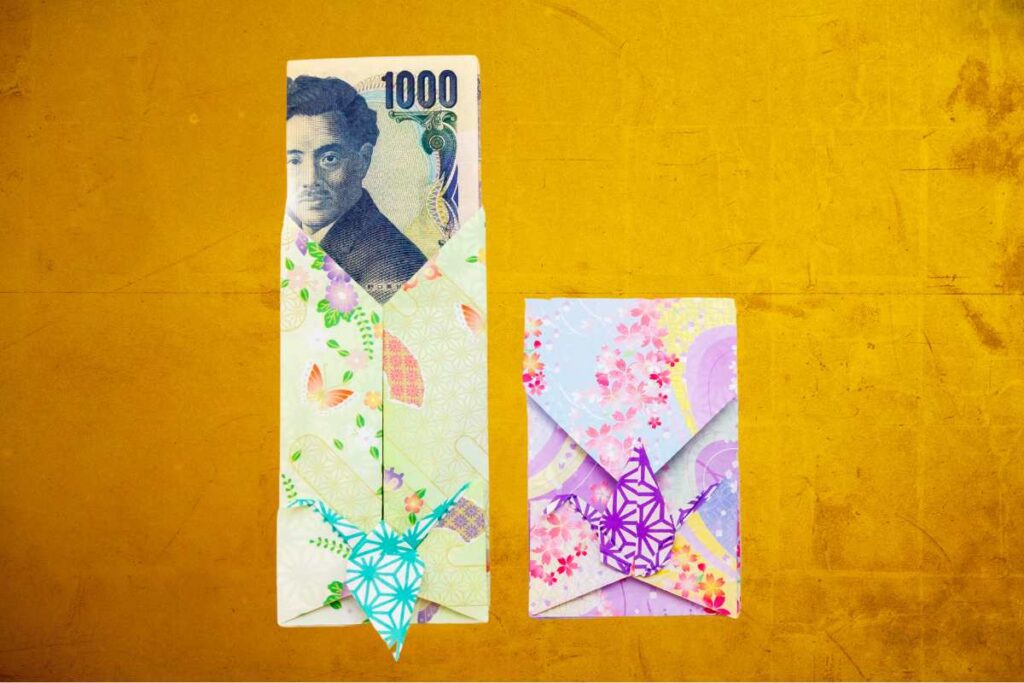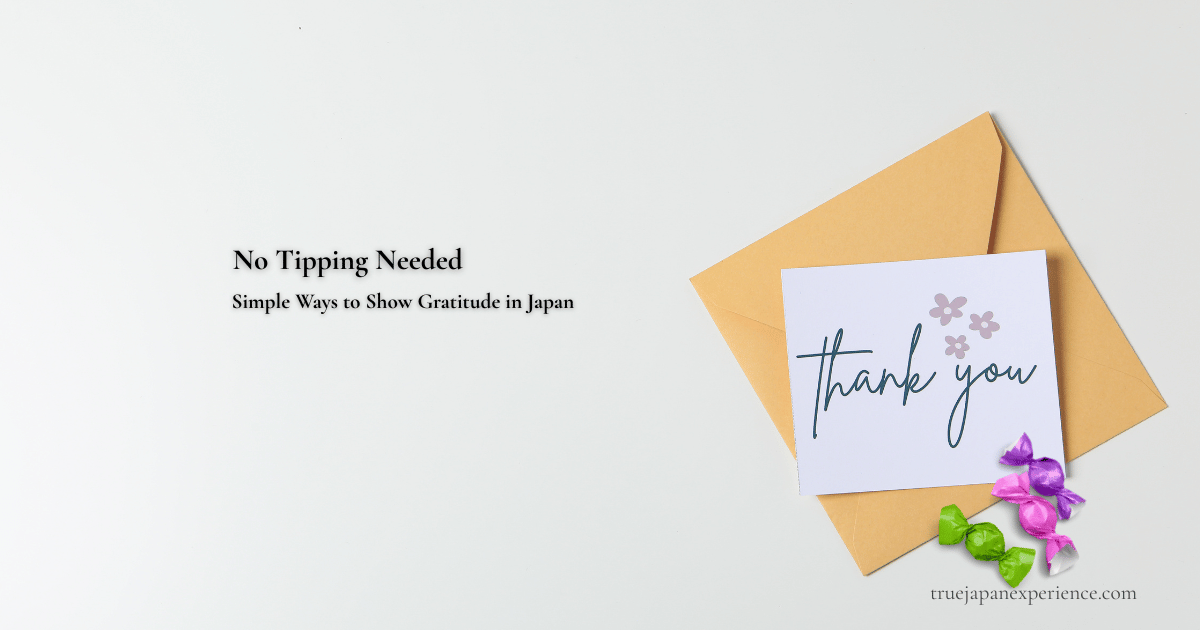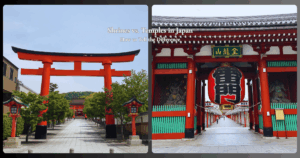No Tipping, No Problem: Japan’s Unique Service Culture and the Tradition of Kokorozuke
Introduction
Many travelers visiting Japan for the first time wonder: “Should I tip in Japan?”
Coming from countries where tipping is customary—such as the United States, Canada, or many parts of Europe—it’s natural to feel unsure about how to show appreciation for good service in Japan.
The short answer is: tipping is not required or expected in Japan.
In fact, attempting to tip in most situations may cause confusion, or even be politely refused.
This article will help you understand the why, not just the what, behind Japan’s no-tipping culture.
You’ll also learn about kokorozuke (心付け), a traditional—but rare—gesture of gratitude, and why respecting local customs is key to being a mindful traveler.
Why There’s No Tipping Culture in Japan
One of the most surprising things for many first-time visitors to Japan is that tipping simply isn’t part of the culture—not at restaurants, not at hotels, not even in taxis. But this isn’t just about following rules. It’s about a deeper way of thinking.
In Japan, good service is considered a basic part of any job, not something that deserves extra payment. Staff in restaurants, inns, or stores are trained to provide attentive, respectful service to everyone—no matter who you are, or how much you’re spending.
This idea is rooted in the cultural values of sincerity (makoto) and humility. Taking pride in one’s work, and doing it properly without expecting a reward, is considered honorable.
Unlike in some Western countries where tipping is expected as part of a worker’s income, Japanese businesses usually include service charges in the bill—so there’s no need for anything extra.
That’s also why trying to tip may feel awkward for many Japanese staff. It’s not that they’re offended—it’s just not part of their system. Some may even chase after you to return what they think is forgotten change.
In short, excellent service in Japan doesn’t come with a price tag—it comes from the heart.
What Happens When You Try to Tip?

Many foreign tourists have shared stories of trying to leave a tip in Japan—only to be politely refused or met with confusion. Here are some real-life examples that show how different things can be:
・Some guests leave money for hotel cleaners, thinking it’s a nice gesture—only to come back and find the money untouched on the table.
・At restaurants, tourists sometimes try to hand cash directly to their server, but are politely told “no thank you.”
・One traveler recently shared a story online: they were aware that tipping isn’t common in Japan, but wanted to show appreciation for great service and left a tip on the table before leaving. Moments later, a staff member ran after them outside the restaurant, saying “You forgot this,” and handed the money back. It wasn’t rudeness—it was just the staff doing what they believed was right.
These experiences may feel surprising at first, but they reflect a core part of Japanese culture: service is given with pride, not for reward.
Trying to tip doesn’t offend anyone—but it can sometimes create confusion for staff who aren’t used to dealing with it.
Understanding Kokorozuke: A Cultural Custom

Some people say kokorozuke is just like tipping—but that’s not exactly right.
Yes, it involves giving money. But unlike Western tipping, kokorozuke isn’t about rewarding service or improving it. It’s a quiet, personal way of saying thank you, often seen in traditional settings like old-style ryokan or fine dining places.
Even in Japan, this custom is rare today. Many locals, especially younger generations, don’t really practice it—and honestly, even I sometimes wonder if I should give it or not.
Once, I gave kokorozuke to a staff member at a ryokan. They accepted it politely and explained it would be shared with the team. At checkout, the okami gave me a small local gift as a return gesture. It was a nice experience, but I wouldn’t expect it at most places.
That’s why, if you’re not sure, it’s perfectly okay not to give kokorozuke. You won’t offend anyone by skipping it. In Japan, appreciation is usually shown through polite words, not money.
If You Still Want to Give Kokorozuke: Some Practical Tips
Of course, if you’ve done your research and feel confident that kokorozuke is appropriate in the place you’re staying, here are a few simple guidelines to follow:
・Put the money in a small envelope (like a pochibukuro). Never hand it over directly.
・Avoid coins. A clean bill of ¥1,000 to ¥3,000 is generally enough.
・Include a short phrase like “Thank you for your help” when giving it.
That said, remember: kokorozuke is never required, and many places may politely decline it. You’re not doing anything wrong by skipping it.
And just to be clear—kokorozuke is a custom found only in traditional ryokan or fine dining establishments. You won’t see this at regular hotels, casual restaurants, or shops.
Recent Changes: Tip Boxes for International Visitors

With the rise of inbound tourism, a few businesses in Tokyo, Kyoto, and Osaka have introduced tip boxes to accommodate foreign guests who strongly feel the need to leave a tip.
However:
・This is not widespread and is still considered outside the norm.
・Some places clearly state: “Tips are not necessary, but thank you.”
・These tip boxes are a compromise, not a shift in cultural values.
But if visitors continue to insist on tipping in a country where it’s not part of the culture, Japan may slowly begin to lose what makes its service so unique.
The more we push our own customs onto others, the more we risk turning Japan into just another place where good service only comes after money is offered.
How Can You Show Gratitude in Japan Without Tipping?
If you’ve been impressed by great service in Japan,
you might still want to say thank you in a meaningful way—even though tipping isn’t expected. Fortunately, there are many other ways to express your appreciation that are more in line with Japanese culture.
Here are some thoughtful and respectful options:
1. Say it with words and a smile

In Japan, sincerity matters. A simple “Arigatou gozaimasu” (thank you very much) or “Gochisousama deshita” (after a meal) said with a warm smile goes a long way.
You don’t need to speak the same language to show your appreciation.
A warm smile and a sincere “Thank you” are more than enough in Japan—kindness speaks for itself.
2. Leave a short note or thank-you message
A handwritten message or small thank-you card can be very meaningful.
You might write something like, “Thank you for your kind service. I had a wonderful stay.”
Especially in hotels or traditional inns, this small gesture is often remembered and appreciated.
3. Give a small non-cash gift
If you still feel like giving something, a small souvenir from your home country—like local candy, tea, or a postcard—can be a thoughtful gesture.
Avoid anything expensive. It’s the feeling that counts. A phrase like, “It’s just a small gift to say thank you,” will make your intent clear.
4. Write a positive review
One of the best things you can do is leave a kind review on Google, TripAdvisor, or social media.
Mentioning the names of staff who helped you or describing your positive experience directly supports them and their workplace. It also helps future travelers find great service.
💡 Final Thought
In Japan, the most meaningful ways to say thank you are through kind words, respectful actions, and thoughtful gestures—not money.
These approaches will always be well received, and show that you truly understand and respect Japanese culture.

Final Thoughts: Respect Local Customs Wherever You Travel
Before visiting any country, I always take time to learn about its culture and customs—because that’s what being a respectful traveler means to me.
For example, I live in Japan, where tipping simply isn’t part of everyday life.
I’ve never tipped at restaurants or hotels here, because it’s not expected, and doing so can actually be confusing or even awkward for the staff. But when I travel abroad to places where tipping is customary—like the U.S. or parts of Europe—I have no hesitation at all in tipping. That’s just common sense to me: when you visit another country, you follow their ways, not yours.
Trying to tip in Japan just because “that’s what we do back home” isn’t really kindness—it’s a misunderstanding of the culture. And when many travelers do this, it can slowly pressure Japanese businesses to adjust, even though tipping doesn’t fit their traditions.
So if you truly want to show respect and appreciation, learn the local etiquette before you go. Pay a tip where it’s expected—and don’t insist on tipping where it isn’t.
That’s how we travel better, and how we help keep the beauty of each culture alive.










